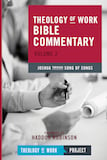Best of Daily Reflections: Avoiding the Influence of Mockers
Daily Reflection / Produced by The High Calling
Oh, the joys of those who do not follow the advice of the wicked, or stand around with sinners, or join in with mockers.
Psalm 1:1
We live in a society of mockers. People who mock consider themselves better than others. They do not enter into serious engagement with people or ideas when these people or ideas are not to their liking. They do not offer others the respect implicit in genuine debate. Rather, they seek to elevate their own status by scorning that which they dislike or disbelieve.
Scorn of this sort is all too common in our society today. I'm not referring to thoughtful parody, but rather to superficial scoffing. You can watch it on television. It's all over the Internet. Political ads are particularly adept at scorn, since scorn allows one to put down an opponent without engaging the opponent in a serious way. These days, religious people are especially open to mockery from the irreligious, those who think religion is "religulous" (religious + ridiculous).
In a culture drenched with mockery, it's easy for our hearts to be filled with a spirit of scorn. Scoffing not only puts down that which we dislike, but it also augments our own social standing. Thus, we need to heed the warning of Psalm 1:1 if we want to live joyfully.
In the New Living Translation, the last phrase of Psalm 1:1 asserts that those who do not "join in with mockers" will experience joy. Other translations replace "mockers" with "disrespectful" (CEB), "scoffers" (ESV, NRSV), or "scornful" (KJV). The Message paraphrases, "How well God must like you...you don't go to Smart-Mouth College." Beneath these translations lies the Hebrew word letzim. This word, which appears only here in the Psalms, is common in Proverbs. There we learn that the letzim are foolish (1:22), unwilling to accept correction (9:7), proud, haughty, and arrogant (21:24).
Psalm 1 does not say that we should have no dealings with mockers. Literally, it says that we will be blessed if we do not "sit in the seat of mockers" or "dwell in the dwelling of mockers." This reminds us that the company we keep will have a powerful influence on our behavior. Hang out with scoffers, and it's likely that you'll become one yourself.
Our passage today challenges me to examine my own habits. Do I mock those of whom I disapprove? Do I scorn both them and their ideas? Have I allowed myself to be caught in the mocking spirit of this age? Do I need to repent of the sin of scoffing? Or do I take all people seriously, engaging both them and their ideas with respect? Do I show to all people the love of Christ, even my enemies?
FURTHER REFLECTION: Let me encourage you to consider how you would answer the questions I have just asked of myself.
PRAYER: Gracious God, how easy it is for me to be caught in the mocking spirit of this age. If I'm not scoffing with my words, I may be doing so in my heart. It's so much simpler to look down, up, and laugh at those with whom I disagree or whom I don't like. Forgive me, Lord, for the times when I have indulged in mockery.
Help me, Lord, to take all people seriously, to offer them respect even when they do not respect me. And may I associate consistently with people who do the same, so that I might honor you in all that I do. Amen.






